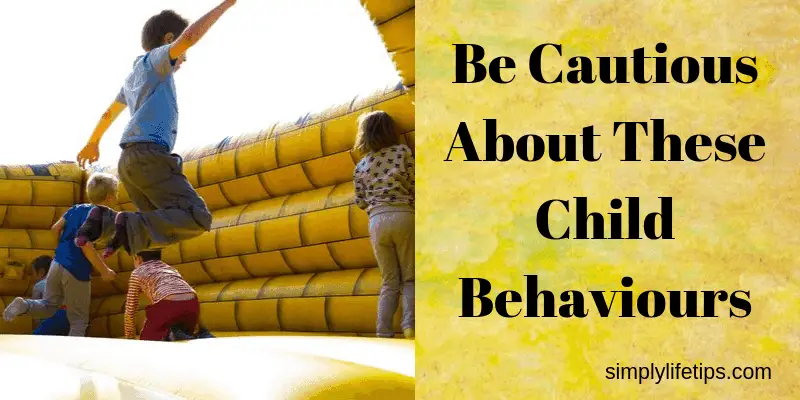Navigating parenthood is an incredible journey, and as parents, we encounter a wide spectrum of child behaviours that shape our children’s development. These behaviours, while often challenging, are a crucial part of their growth. Parenthood is a remarkable journey filled with boundless love, laughter, and cherished moments. Yet, it also comes with its fair share of challenges and responsibilities. As parents, we have the vital task of guiding our children towards becoming well-rounded individuals who can thrive in the world. While every child is unique and will display a range of behaviours, there are certain behaviours that warrant our attention and caution.
In this blog, we will explore some common child behaviours that parents should be cautious about. It’s important to remember that parenting is a continuous learning experience, and being attentive to these behaviours can help us navigate parenthood with care and nurture our children into responsible, empathetic, and well-adjusted individuals. Let’s delve into these behaviours and how to handle them with love and understanding.
Dangerous Child Behaviours
As parents, we often have high hopes and expectations for our children, envisioning them as well-behaved, responsible, and respectful individuals. However, it’s important to recognize that children, in their journey of growth and development, may sometimes exhibit dangerous behaviours that raise concerns. These behaviours can be challenging for parents to address, but it’s crucial to navigate them with care and understanding.
One common mistake parents make is comparing their children to others. Each child is unique, with their own strengths, weaknesses, and pace of development. Comparison can lead to unrealistic expectations and undue pressure, which may inadvertently contribute to dangerous behaviours.
Children are not immune to making mistakes and exhibiting undesirable manners despite our best efforts to instil good values in them. However, as parents, we play a pivotal role in guiding them towards better behaviour and helping them learn the importance of good manners and respect.
In addition to our guidance, seeking wisdom from wise quotes, reading informative articles, and watching inspiring videos can provide valuable insights and strategies for correcting and addressing dangerous child behaviours. These resources can offer fresh perspectives and practical advice to navigate the challenges of parenthood effectively.
7 Types Of Child Behaviours That Are Dangerous
Ignoring someone’s bad deeds
Children sometimes choose to overlook or downplay the misdeeds of their peers or siblings. This behaviour often emerges from a desire to maintain harmony or fit in with a group. It’s crucial for parents to teach their children the importance of standing up against wrongdoing and addressing issues rather than ignoring them, fostering a sense of responsibility and integrity.
If your child chooses to remain silent about any concerning situations involving others, it’s important to have a conversation with them about the difference between being overly talkative and being vigilant.
Sibling rivalry
Sibling rivalry is a common occurrence in households with multiple children. It involves competition, jealousy, and conflicts between siblings. While it may be challenging for parents to manage, it also provides opportunities for children to learn conflict resolution, empathy, and cooperation. Parents can guide their children through sibling rivalry by encouraging open communication, teaching problem-solving skills, and emphasizing the importance of supporting one another.
In the case of sibling conflicts, it’s essential to identify the underlying issues and discourage fighting among your children. Encourage them to work as a team and teach them effective conflict-resolution techniques.
Theft
Discovering that your child has engaged in theft can be a distressing experience. It’s crucial to approach this behaviour with understanding rather than anger. Take the time to uncover the underlying reasons behind the theft, whether it’s peer pressure, a desire for attention, or unmet needs. By addressing the root causes and working together to find solutions, parents can help their children learn from their mistakes and make amends.
Disrespectful attitude
Children may occasionally display disrespectful attitudes, such as talking back, using rude language, or disobeying rules. These behaviours often stem from frustration, a need for independence, or a lack of understanding of boundaries. Parents can address this behaviour by setting clear expectations, modelling respectful behaviour, and teaching children effective ways to express themselves and manage their emotions.
Dishonesty
Honesty is a fundamental value that parents should instil in their children from an early age. If a child exhibits dishonesty, it’s essential to emphasize the importance of truthfulness and the consequences of lying. Encourage an open and non-judgmental environment where children feel safe to admit their mistakes and learn the value of honesty and integrity.
Whining
Whining is a behaviour that many parents find challenging to address. Children may whine as a means to get their way, seek attention, or express their frustrations. While it can be exasperating, it’s crucial to acknowledge and validate their feelings while also teaching them more effective ways to communicate and cope with their emotions.
Rude manners
Children may occasionally display rude manners, such as interrupting conversations, being impolite, or showing disrespect towards others. Parents can address this behaviour by teaching their children the importance of courtesy, empathy, and respect for others’ feelings. Modelling respectful behaviour and providing gentle reminders can help children develop better manners and interpersonal skills.
Do you know 13 Things Mentally Strong Parents Don’t Do?

Read Things You Should Never Forbid Children From Doing
Animated Video
Watch the animated video explaining about 7 Types of Child Behaviour That Are Dangerous to Ignore.
Find Brilliant Tips For Healthy Relationships With Parents
Addressing Dangerous Child Behaviours
- If your child chooses to remain silent about any concerning situations involving others, it’s important to have a conversation with them about the difference between being overly talkative and being vigilant.
- In the case of sibling conflicts, it’s essential to identify the underlying issues and discourage fighting among your children. Encourage them to work as a team and teach them effective conflict-resolution techniques.
- When your child engages in theft for the first time, maintaining a calm demeanour is crucial. Take the time to understand their motives and explain the gravity of their actions. Ask them to return the item (or make amends) and offer a sincere apology to the affected party.
- Instead of resorting to yelling, it’s advisable to explore the root causes of your child’s behaviour. Teach them healthier ways to express their emotions and desires, emphasizing the importance of remaining composed and attentive.
- Address the significance of honesty and trust in relationships to your child in a composed manner. Take a moment to determine an appropriate consequence that reinforces the lesson that lying is unacceptable.
- If your children attempt to gain your attention in a bothersome manner, maintain a calm expression and remind them to communicate in a normal tone of voice.
- When teaching manners to your children, avoid overwhelming them with excessive pressure. Instead, focus on gently reminding them to be considerate of others.
Find Ways To Stop Your Child From Lying.
Final Thoughts
In conclusion, parenting is a journey filled with both joys and challenges. While we may have great expectations for our children, it’s important to approach their behaviours with patience, understanding, and empathy. Dangerous child behaviours, though concerning, can be addressed effectively through open communication, setting realistic expectations, and providing guidance.
It’s essential for parents to remember that each child is unique and may have their moments of slip-ups and mistakes. Instead of comparing them to others, we should focus on helping them learn and grow, instilling good manners and values. Seeking wisdom from wise quotes, informative articles, and inspiring videos can provide valuable insights and tools to navigate these challenges.
Ultimately, our role as parents is to create a nurturing environment where our children can develop into responsible, respectful individuals. By fostering a supportive and loving atmosphere, we can guide them towards a path of positive behaviour and a bright future.
Recommended for reading
- How To Touch The Heart Of Your Children? | Find Talents In Children
- How Overparenting Damage The Future Of Children?
- How To Avoid Teaching Children Bad Lessons?
Are you worried about your child’s behaviours?
I appreciate your visit. I trust you found the post enjoyable.
Remember, Sharing Is Caring! Feel free to share this post on your social media and other networks to help others discover it.
PVM
References: verywellfamily

Mathukutty P. V. is the founder of Simply Life Tips. He is a Blogger, Content Writer, Influencer, and YouTuber. He is passionate about learning new skills. He is the Director of PokketCFO.
He lives with the notion of “SIMPLE LIVING, CREATIVE THINKING”. He Believes – “Sharing is caring.” and “Learning never ends.”



